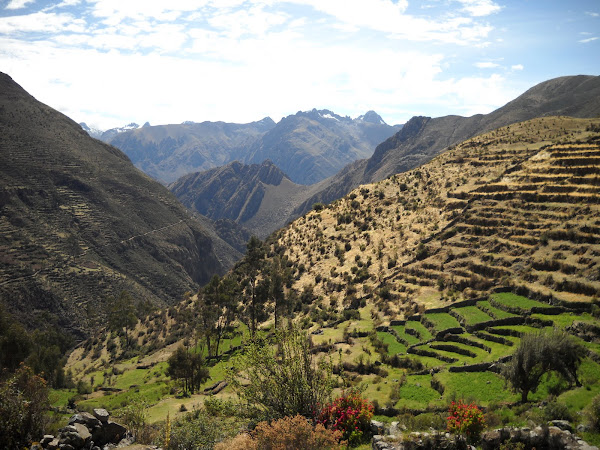Hey everyone, I'm just haning out in Huancayo for the weekend and decided to do a "on the fly" blog and just type without composing something beforehand....so here goes...
We decided to come to Huancayo after having our PEPFAR reunion in Yauyos. It stands for The Presidents (USA) Emergency Plan for Aids Relief, and is a new initiative that is happening all over the world with Peace Corps volunteers and NGO's. The reunion went well, granted just trying to get the presenters to Yauyos was something in need of "Emergency Relief" itself. The presenters were coming from Canete and weren't familiar with the area and pretty much spent a day and a half just trying to get to the town we recomended them going to in the first place! Oh well, once the two day reunion (usually three days without hectic traveling) got started we were able to become incredibly informed on the current stats and findings of AIDS/HIV. We (me and my volunteer buddies from Yauyos) all brought one student, a professor, and a health post worker to the presentation and by the last day we all were able to develop a mini-project for our sites to start promoting AIDS/HIV prevention. I would say all in all it went well, we were able to "capacitar" our host country counterparts from the health posts, and we all develop small projects for our sites and learned how to ask for funds in the future.
Like I said, we decided to come to Huancayo to visit the ATM since we all pretty much ran out of money on travel and hotels during the PEPFAR reunion, and sadly enough this will probably be one of the last, if not the last, times we all get together in Huancayo before the other Yauyoiners head out and their replacements come in.
In site I've happily started my environmental class with the elementary (primaria) students; see picture-----

So as it stands now, I pretty much have classes all week; Mon, Wed, Fri with the little ones and Tues, Thurs with the Jr. High/High Schoolers. Its going good so far, and the elementary kids are such a positive energy boost. Every time I walk into the class I get a heartfelt "Buenos dias joven Markos!" and when I have to skip a class because of some sort of travel outside of my site I definitly hear about it the next day from the kids. I'm really glad I held off on teaching with the little kids because now I have a nice, energetic and positive way to start my second year.
I'm not sure if I've mentioned my Christmas trip in my blog yet, but we've bought the tickets and will be home Dec 19th-9 Jan. As Dad calls it, it will be the "Winter Concert Tour" for Frieda and I, and i'm super excited to bee-bop around the country.
I'm starting to realize that my second year will probably have much more traveling around Peru than I gave myself in my first year. Dad and Rhonda have already said they want to come and visit, and maybe I can get some more of you fearless travelers to take the leap and come see Peru.
I also want to start a blog discussion if possible. The question I propose is; Should I go to Med-School? Since i'm considering being a nurse, I thought I might as well consider being a doctor as well. Let me know what you think or share any personal stories or ideas, I'd love to hear from you.
Alright, we're about to go and get some lunch so I'll talk to you all later!
.jpg)
.jpg)




 Hey Everyone, its been awhile since I updated the ole' blog, sorry about that. I'm going to let the pictures speak louder than my words....
Hey Everyone, its been awhile since I updated the ole' blog, sorry about that. I'm going to let the pictures speak louder than my words....
.jpg)

